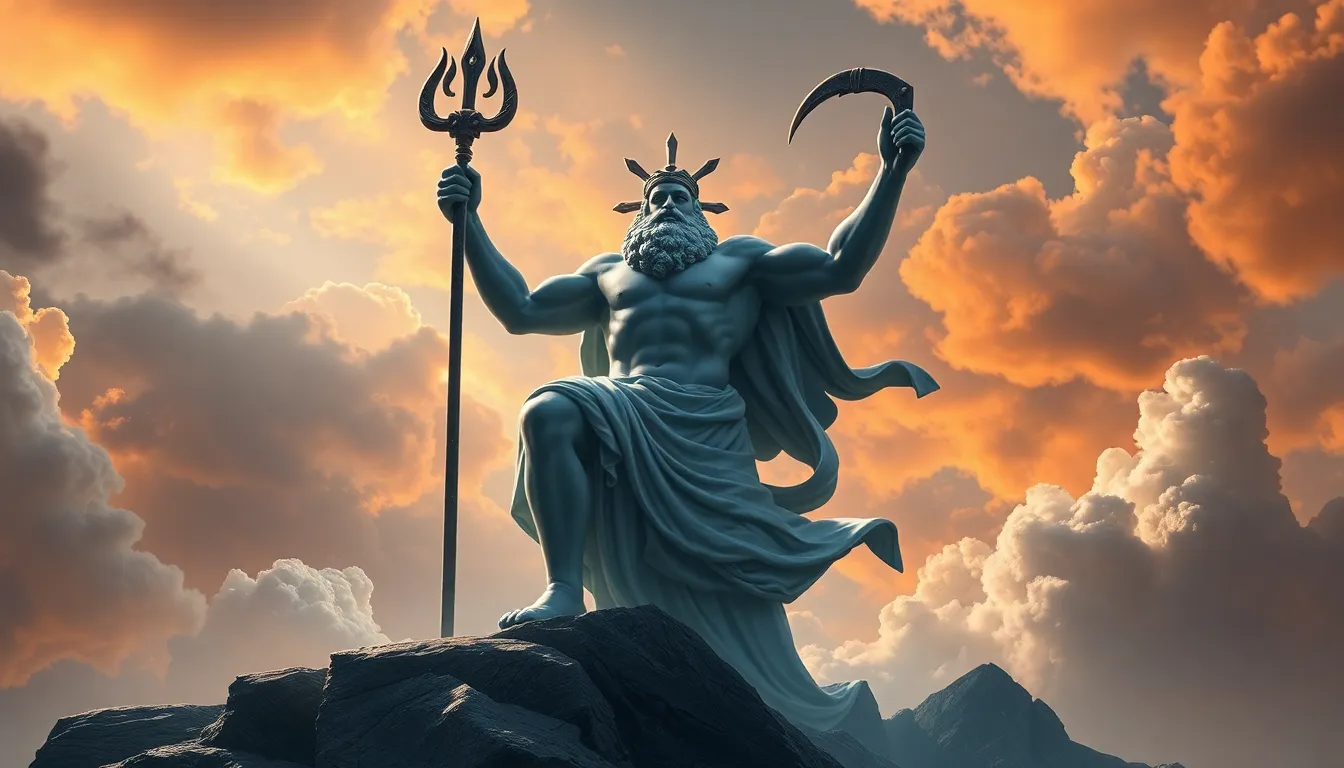Uranus: The Titan Who Was Overthrown by His Own Son
I. Introduction
In Greek mythology, Uranus is a primordial deity representing the sky. He holds a significant position in the genealogy of the Titans, being one of the first beings to emerge from Chaos, the void that existed before the cosmos. This article explores the intriguing myth of Uranus, focusing on his relationships, reign, and eventual downfall at the hands of his own son, Cronus.
II. The Birth of Uranus
Uranus is often regarded as the personification of the sky. According to myth, he emerged from Chaos, the original state of existence, which encompassed everything before the creation of the world. His existence is intrinsically tied to Gaia, the Earth, who is also a primordial deity. Together, they represent the duality of sky and earth, forming the foundation of the natural world.
III. The Offspring of Uranus and Gaia
Uranus and Gaia had many children, significantly impacting the mythological landscape:
- The Titans: Twelve Titans were born to Uranus and Gaia, including notable figures like Cronus, Rhea, Oceanus, and Hyperion.
- Cyclopes: These one-eyed giants were also offspring of Uranus and Gaia, known for their immense strength and craftsmanship.
- Hecatoncheires: Three monstrous giants with a hundred arms and fifty heads, known for their formidable presence.
Despite their progeny’s power, the family dynamics were complex, marked by tension and conflict that would ultimately lead to Uranus’s downfall.
IV. The Reign of Uranus
As a ruler, Uranus was characterized by his oppressive nature. His relationship with Gaia and their children became strained over time. He feared the power of his offspring, leading to his cruel treatment of them. Uranus imprisoned many of his children within Gaia, causing her immense pain and dissatisfaction. This oppressive rule sowed the seeds of rebellion among the Titans, particularly in Cronus, who would rise against his father.
V. The Conspiracy Against Uranus
Gaia’s dissatisfaction with Uranus’s rule led her to plot against him. She sought a way to free her imprisoned children and restore balance. The key players in this conspiracy included:
- Gaia: The Earth mother, who was determined to end Uranus’s tyranny.
- Cronus: The youngest Titan, who was persuaded by Gaia to carry out the act of rebellion.
- The Sickle: A crucial weapon in the overthrow, crafted by Gaia to aid Cronus in his mission.
These elements combined to create a potent plan aimed at dethroning Uranus.
VI. The Overthrow of Uranus
In a decisive act of rebellion, Cronus ambushed Uranus, using the sickle to castrate him. This event marked a significant turning point in the mythological narrative. The immediate consequences of Uranus’s defeat were profound; he was no longer able to exert control over the cosmos, and the balance of power shifted towards the Titans.
The symbolism of the castration event is rich with meaning. It represented not only the end of Uranus’s oppressive reign but also the severing of his connection to the earth, allowing new generations to rise without his interference.
VII. Aftermath and Legacy of Uranus
The overthrow of Uranus had lasting implications for the Titan dynasty. Cronus became the new ruler, ushering in an era marked by his reign. However, the legacy of Uranus persisted:
- Transformation: After his defeat, Uranus was transformed into the starry sky, symbolizing his continuous presence in the cosmos.
- Impact on the Titans: The Titans continued to play a crucial role in subsequent myths, including the eventual overthrow of Cronus by his own children, the Olympian gods.
- Cultural Influence: Uranus’s story has influenced various literary and artistic depictions throughout history, resonating with themes of power, rebellion, and familial conflict.
VIII. Conclusion
The myth of Uranus encapsulates profound themes of power and betrayal. His story serves as a cautionary tale about the consequences of tyranny and the inevitable cycle of rebellion and succession that characterizes mythology. The enduring relevance of Uranus’s tale can be seen in modern culture, where themes of familial strife and the overthrow of authority continue to resonate.
Ultimately, the story of Uranus reminds us of the complexities of power dynamics and the timeless nature of mythological narratives that explore the human condition.




